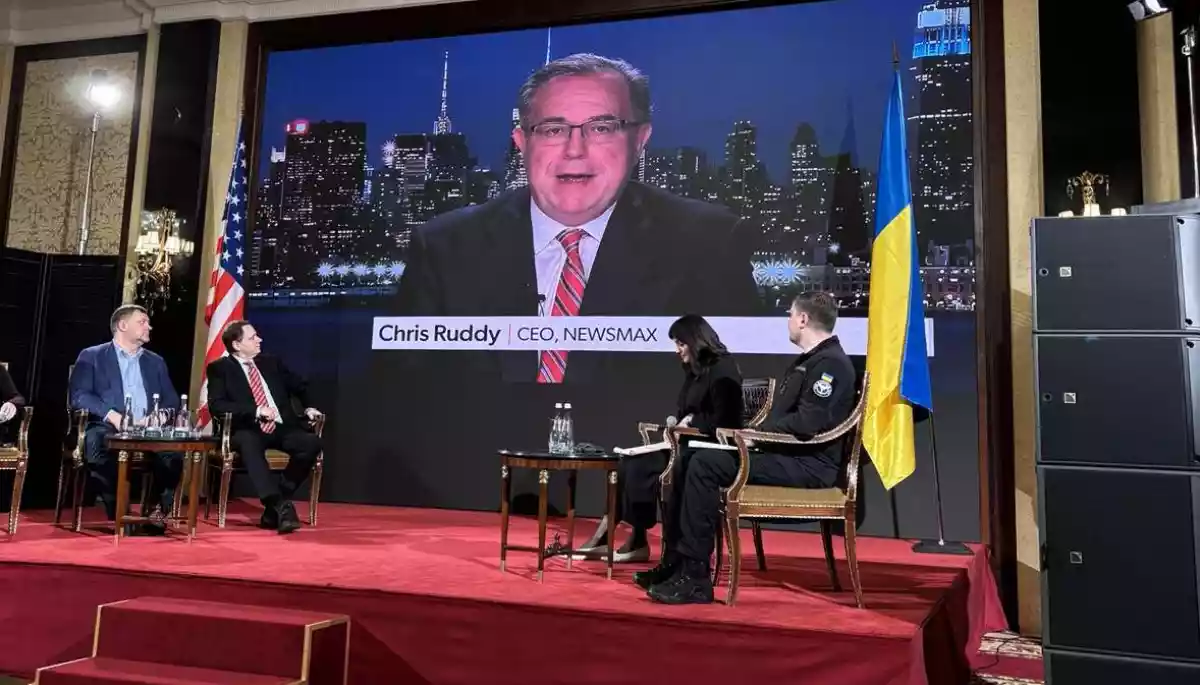
Circular Firing Squad: President, Government and Parliamentary Groups about Donbas
Circular Firing Squad: President, Government and Parliamentary Groups about Donbas


Overview of public communication policy about the Donbas (March-April 2017).
NGO Detector Media is launching the Donbas public communication policy monitoring. Analytical reports will be published on a bi-monthly basis. The monitoring methodology can be found here.
The project is implemented with the support by the National Endowment for Democracy (NED).
You can also find this article in Ukrainian.
The blockade of trade with the ORDLO (“ORDLO” is a transliteration of Ukrainian abbreviation for official term “Certain Regions of Donetsk and Luhansk Oblasts”) and assessment of its consequences for the country were the main topic of the authorities’ communication about the Donbas. The so called 180° turn has become its major issue: after the National Security and Defense Council’s decision on introduction of the temporary regime of no-cargo transit across the delimitation line (the authorities used this convoluted wording to avoid the ‘blockade’ mention), the Government and the President had to explain why this step was ‘right’ and ‘the only possible’ after the extensive campaign to discredit the civil society’s blockade and intimidation with its aftermath (rolling blackouts, drop in the living standards).
This is a real issue with a longstanding effect and will be another example of the public policy’s short-sightedness about the Donbas problematique. Such hairpins do not pose problems only if the population, for a reason, basically trusts the decision-makers, or if the media are under full control of the authorities. Since the Ukraine’s situation is almost the opposite, we believe, the political and communication ‘hairpin’ on the blockade topic may cause the substantial damage to the Ukraine’s decision-makers.
In March-April, the President of Ukraine focused on three subjects: the comments and assessments of the enforcement bodies, the Donbas combat action and the negotiation progress with foreign partners about the Minsk Process were the most often.
On the face of it, this appears logical as the President, according to the Constitution, is responsible for the foreign policy, national security and defense. And Petro Poroshenko is constantly showing his ambitions of ‘nation leader’ who understands and knows his fellow citizens best of all.
But the analysis of the President’s media activity shows only that the condition of the Donbas residents didn’t interest him that much. Having a working visit to Luhansk oblast, Petro Poroshenko addressed to the ‘Donbas locals’ directly in his official speech only once.
Even more, the President didn’t make any comment on the issues of internally displaced persons that were actively discussed by media, especially on TV, in March-April: transitional housing conflicts and suspension of pensions and allowances to dozens of thousands of displaced persons following the Ukrainian Security Service’s motion. On the one hand, this is under the responsibility of the Government and PM (check the next paragraph). On the other, the President leads the political coalition and is responsible for the candidates for PM and other official posts including the Security Service head. So keeping silence on these matters means either ignoring them or unawareness of their social and political importance.
The Prime-Minister was one of the most active users of the Donbas subject. Though the criticism of the civil blockade of transport routes and its aftermaths was the key point of the Premier’s messages. They were targeted at the widest audience and aimed at make him look good against the backdrop of the ‘threats’ and ‘destructive actions’ of the opposition. One may assume that Volodymyr Groysman makes use of the Donbas-related problems to make his political hay. But during the reporting period he was ignoring the topical issues related to the Donbas residents: suspension of allowances based on the Ukrainian Security Service’s motion, legal, accommodation and utilities problems of the IDPs. This might be explained by a mere lack of Groysman’s concern about this group of electors.
The MIA’s messages were the same way superficial and politicized. The Donbas military operations were the topical issue of the Ministry’s messages that is supposed to deal with the law enforcement. However, the deepest concern is about the statements of the Minister of Interior who used the Donbas topic to have an image of one of the top fighters against Russia. For example, Arsen Avakov mentioned the Donbas only twice: in March when awarding volunteer soldiers, he underlined the volunteer battalions’ ability to fight back the aggressor. Given the controversial image of these units in the region, this kind of message was hardly appreciated by most of the Donbas locals. Later in April, in Severodonetsk, when granting, on behalf of the Government, apartment keys to the police officers, Avakov referred to the "sociology from the other side showing that nearly 70% of people want to return to Ukraine". With all due respect to the Minister of Interior, such statements look more like a manipulation of "fait accompli" when propagandists mistake the wish for the reality. This is no different than the statements by the separatist leaders that the people of the "South-East" are waiting for the "liberation" from the "Kyiv junta."
At the same time, the Minister Avakov completely ignored the need to comment on the verdict of "Tornado" ex-soldiers who when doing the MIA service committed serious crimes against the Luhansk region residents. As Avakov is directly responsible for the actions of his subordinates, the verdict was supposed at least to encourage to present public apology and detailed explanation by the MIA what was done to avoid similar crimes in the future. Such messages would be more important for people who want to return to Ukraine.
In contrast to the President, the Prime Minister and the influential Minister of Interior, their party fellow the Secretary of the National Security and Defense Council Oleksandr Turchynov had the most targeted communication. He followed the scope of its official powers in almost all of his messages. For example, in an interview to the BBC Ukrainian, Turchynov was able to outline and explain clearly the Ukraine’s strategic course of action concerning Russia and the occupied territories, to underline his personal responsibility for decisions taken in 2014. Yes, the NSDC Secretary made it clear that Ukraine does not refuse from the use of force to regain the occupied territories, while his ultimate head – the President of Ukraine – did not touch the subject of future actions in the region at all.
However, Turchynov failed to resist giving the political promise. Yes, he used a reference to the residents of uncontrolled areas to pressure the Government to allocate funding to implement a new project of the State Service for Special Communications and Information Protection: to purchase the recently discovered national information security system that is "much cheaper than foreign analogues." And the NSDC Secretary used the "fait accompli" hook arguing that "soon people in 30-50 km behind the delimitation line will listen to the Ukrainian radio and watch Ukrainian TV-channels." While the Donbas residents face the contrary: Russian and separatist media broadcasting prevails in the Ukrainian front-line territory.
This instance is also interesting as it shows how the governmental bodies and officials may use the hot topics for promotion (public advocacy, protecting and legitimization) of their own political plans and interests of their agencies.
Though there is another example when messages by other sources are used to simulate the intense activity. In March-April this was the case of the Ministry of Temporarily Occupied Territories (MinTOT). Most of its messages refer to actions of the Government and other agencies, the President, even private companies (Donbasenergo) and foreign countries (Canada, EU). In light of this, a question arises: if the MinTOT has nothing to report on their activities, or their PR service misunderstands the priorities in informing the citizens about the Ministry’s action. In any case, this kind of communication with citizens, not to mention with the Donbas residents, cannot be called satisfactory.
The communication activity of the Donetsk and Luhansk Civil-Military Administrations was limited to reposting of press-release points describing the activity of their leaders. Both administrations hold themselves out as key agents of change in the region continuing the paternalistic tutelage over the population the same way as the Yanukovych-times local authorities did. Moreover, the style of some messages makes impression of Soviet newspapers reprints: "The scale reconstruction is really impressive, - Yurii Harbuz said during the inspection. – The work is humming along, about 70 builders work here every day. So by the mid-summer we are to have a true center of cultural life in Luhansk!"
However, the biggest concern is the use of future tense, conditional and imperfective aspect in the messages by both CMA: "Yurii Harbuz promised to buy three school buses for young Milove residents and help disabled people", "If Severodonetsk city council does not work, I will offer the President to establish a CMA there, says Harbuz ","Together we’ll change the economic map of Donetsk oblast for better, Pavlo Zhebrivskyi." On the one hand, the messages of Harbuz and Zhebrivskyi dealt with current issues of local development. On the other hand, these were mainly political promises of change for the better in an uncertain future. The leaders of Donetsk and Luhansk CMAs on rare occasions undertook for setting the exact timeframe to fulfill their promises.
Given the peculiarities of the attitude of local people to the new authorities and established opinion of "strong executives" that controlled the regions until 2014, this communication policy is quite risky and short-sighted. Unfulfilled promises in these conditions will have more adverse effect on the sentiments than the lack of communication from the authorities. NGO Detector Media will keep on monitoring how the CMAs in both regions will report on the performance of their words, as the efficient follow-up based on trust between the government and the society is essential for combating subversive information efforts of Russia and the separatists.
In this context, the communication activity of the first Deputy Head of the Verkhovna Rada Iryna Gerashchenko catches the eye. She was the one who recalled the residents of liberated and uncontrolled Donbas territories the most often. However, in all cases both groups were presented as victims of the occupation regime of Russia and insurgents. Ms. Gerashchenko spread this kind of description not only to the domestic audience but also at an international meeting.
Unlike the NSDC Secretary Turchynov, the first vice-speaker was constantly underlining that Ukraine is going to regain the occupied territories by means of political and diplomatic actions only.
Though the presented material is not enough to have solid deductions about the reasons of such principal difference in their approaches, we can make few assumptions to be checked in future reviews.
First. The authorities may have different approaches to different audiences. For the civilians and international partners – the official speakers will enlarge on the peaceful solution to the conflict. If addressing to the army or to the enemy, the so called hawks reminding of armed solution will be used. This means that the top level (the President, the Prime Minister) will be trying to avoid a clear identification of their position so that to have some room for maneuver in a crisis.
Second. The struggle between supporters of different Donbas strategies might still be the case for the president's circle. Efforts to talk the society over are an evident proof of this struggle. While such competition within a team is acceptable in normal conditions, the enemy may use it to undermine the people’s trust in the war-like situation. So, eventually, the leader (i.e. the President) will have to make up his mind and put an end to the struggle.
Third. Such controversial signals to citizens can be explained by the political climate and the politicians’ desire to speak one language with their electorate or leaders. This is particularly the case of the Prime Minister who switched from the harsh critics to the consistent support of the blockade: "Prime Minister: the artificial energy blockade is a blockade against Ukraine" (02.03.2017) and "Volodymyr Groysman on energy blockade: We will not buy coal from aggressor, it is unacceptable" (11.04.2017). In a nutshell: the authority’s communication activity on the Donbas matters in March-April cared mainly about the impression its actions in the region made on the voters, foreign partners and opposition. Its main goal was to produce an impression on all these target groups that the government knows what to do and does something to solve the conflict-related problems.
But this communication missed the feedback from Donbas residents both in the liberated and occupied areas. Whereas the Donbas developments were actively used by the officials for gaining of political grades and ministerial interests promotion.
It is worth mentioning that the communication activity of leading political actors was little or no different to that of official authorities. For example, the transport routes blockade and its aftermaths were the main topic of their messages. And all kinds of politicians were focused on finger-pointing rather than on offering the Donbas locals the options to adapt to the new reality.
Furthermore, the parties’ communication activity analysis shows also differences in their positions about the Donbas problematique.
For example, the President’s Solidarity is the most confident in commenting anything related to the Minsk negotiation process and occupied territories situation. The party holds the cards here, as its representative Iryna Gerashchenko often talks to media based on the reputable source of information. But only a few messages touch the Donbas locals: “Iryna Gerashchenko: Security of roadblocks under the constant fire is still a major problem.”
While the messages of deputies of the president’s BPP "Solidarity" on the social and economic situation in Donbas were full of promises like the ones of the CMA heads: "Iryna Suslova: There should be a law to regulate the government compensation for damages caused to the residents of frontline towns and villages", "Vitaliy Kurylo : The city of Shchastia should have either civil-military administration or elections."
At the same time, the speakers of the coalition People’s Front, the party that delegated the Vice PM for social policy to the Government, didn’t utter a mere word about the social situation and problems of IDPs. It is notable that the regional issue was also ignored by Samopomich having focused on defending their position about the route blockade.
Whereas on the other side of the political spectrum, the Opposition Bloc has almost taken the lead in IDPs problems. This happened under the blatant disregard of the subject by the Government and coalition parties. Messages by the party leader Yuriy Boyko confirm that the matter is of high priority for the Opposition Bloc. At the same time, the OB can’t hide some internal competition: most of the issues related to the regional social and economic development are raised by Nataliia Korolevska. Making statement on her behalf that the Donetsk people support the exclusively diplomatic solution to the armed conflict is symptomatic.
The position of the "Fatherland" (Batkivshchyna) party is substantially promoted by its Donbas-origin member, the chairman of the Human Rights Committee Hryhoriy Nemyria. In terms of the number of messages about the IDPs problems, he is second only to Yuriy Boiko from the Opposition Bloc. On the other hand, the party leader Yulia Tymoshenko refraining from commenting on any Donbas-related matters is symptomatic.
This makes a contrast to the extremely personalized communication of the Radical Party leader Oleg Lyashko. Unlike the Opposition Bloc or Bloc of Petro Poroshenko who focus on sharing messages about their plans or criticism of the authorities, Lyashko presents himself as a politician who "does real work" and "achieves results": "Lyashko saved Mariupol from debt domination", "Lyashko stood up for IDPs." Thus, the Radical Party leader exploits the Donbas theme in order to compete directly with the President and the Prime Minister as the executive power representatives and to look advantageous compared to other opposition actors who criticize only.
So, like the official authorities, the main political actors mostly avoid talking to citizens about their strategic vision in the region. The Opposition Bloc and the BPP are the exception, they seem to compete in imposing their interpretation of what a "political and diplomatic way" should be. This confrontation has intensified during the civil blockade and subsequent decision of NSDC.
One can say that the blockade has become a kind of "point of no return", the political actors and society communication test. For instance, it will be difficult for the Opposition Bloc to pretend that the situation has returned to normal after such statements: "Oleksandr Vilkul: The complete blockade means the loss of the hope for peaceful life in a normal country" or "Borys Kolesnikov: Pushing Donbas away we destroy Ukraine."
The BPP will also have difficulties to explain the need to cooperate with former coalition partners – Samopomich and Fatherland – after the competing accusations of subversive activities in favor of the Kremlin, on the one hand, and involvement in the smuggling from ORDLO, on the other: "Politicians striving for the approval of the occupied territories status act against the Ukraine’s interests, - Volodymyr Aryev", "Ivan Vinnyk: The investigation will estimate the damage to the State caused by the deputies participating in the trade blockade", "After the NSDC decision the ‘smuggled goods exchange’ with ORDLO has increased, - Pastukh," "Fatherland calls for investigations of the war earnings, – Tymoshenko."
Thus, the March-April monitoring revealed the polarization of information space: the messages on the Donbas matter were a means for political positioning and attacks on opponents, defending of own interpretation of events and discrediting of alternative opinion.
To sum up, the Government and political parties did not contribute to but exhausted the credit of confidence (of the national as well as of the Donbas audience) to promote their messages; did not explain their actions, and accused others of destructive actions. Furthermore, the direct address to the Donbas residents was left behind, they did not show any willingness to get any feedback and adjust their political behavior, direction or content of communication.












